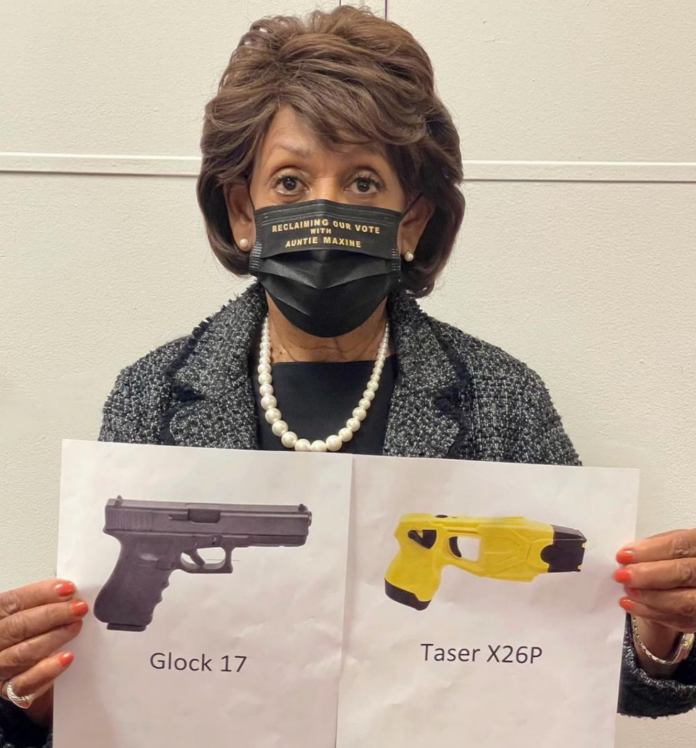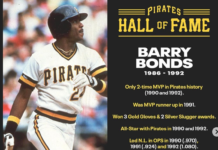Policing in America as it relates to race and racial bias is yet again at the center of the nation’s consciousness following the recent fatal police shooting of 20-year-old Daunte Wright in Minnesota, just a few miles away from the ongoing murder trial of Derek Chauvin, the former Minneapolis police officer involved in the death of George Floyd.
In an exclusive interview with theGrio on Wednesday, U.S. Vice President Kamala Harris called for “full accountability” in the Chauvin case and weighed in on a growing debate in the shooting of Wright, who was fatally shot by former Brooklyn Center officer Kim Potter, who fired her gun after reportedly mistaking her firearm for a Taser.
On Tuesday, Congresswoman Maxine Waters posted a picture on social media of herself holding up two pictures: one of a Glock 17 typically carried by officers and a Taser. “How could a trained officer make a mistake shooting an unarmed man with a gun instead of a Taser? Hard to believe,” Waters wrote.
“There is a big difference between the two,” Harris told theGrio. “Among the issues is the issue of training and having law enforcement who carry both be very clear about the difference between the two, because as we have seen the consequence can be the loss of life and an unjustifiable loss of life.”
Ironically, Potter was a 26-year veteran on the job who trained younger, less experienced officers. The vice president echoed public statements she made Tuesday about Wright’s death, saying “he should still be alive today.” Harris also noted that Wright was the father to a young son, stating “that little baby boy of his is without a father … he has a family that loves him.”
Chauvin’s trial is also dominating headlines and the concern over the anticipated verdict is one of the foremost thoughts on President Joe Biden’s mind. During a two-hour meeting with the Congressional Black Caucus, President Biden raised concern telling the lawmakers that the administration is developing multiple public response scenarios that could ensue from a not guilty verdict in the trial. The president did not go into details nor mention anything about possible unrest from the trial.
Recently, White House officials have been meeting with Black leaders nationally and locally about different scenarios that could take place in the outcome of the trial. According to sources close to some of the conversations, the White House has signaled it’s very concerned. Vice President Harris emphasized that regardless of any outcome in the Chauvin trial, American citizens in Minneapolis and throughout the country have the right to use their First Amendment rights, noting that protest is “part of American life.”
“Certainly we want to make sure that the American people call for justice … we all want to know that those calls are met and we need to all be aware that when those calls for justice are not met, people rightly express their First Amendment right to speak out, to assemble and to express their concern, their pain, their disappointment,” said Harris. “As long as it’s peaceful protests.”
Minneapolis and surrounding cities are a tinderbox after Wright’s death. Curfews are being enacted as the National Guard and police confrontations with protesters are taking place with tear gas and flash bangs just miles from the Chauvin trial. The officer who killed Wright, Kim Potter, and Brooklyn Center Police Chief Tim Gannon have resigned from their posts. On Wednesday, prosecutors handling the case announced second-degree manslaughter charges against Potter.
So far we’re three weeks into the Chauvin trial and the defense is likely to rest its case in a week or so. The verdict could trigger more unrest, as the expectation is not just protests in Minnesota but around the country. Quelling tensions is the focus.
However, Former Democratic New York Governor David Paterson tells theGrio, “I understand why the community has outrage. But I also understand it was violence that killed George and so many others. We do not have to adopt the conduct of the oppressor to win rights in this country.”
“I would advise the administration that there has got to be some segment of federal law enforcement that investigates these specific cases — cases in which individual police officers are accused of endangering the civil rights of African-Americans, Hispanics, and even a few cases where those who are mentally disturbed have had these misfortunes,” Patterson urged.
Former Baltimore City Mayor Stephanie Rawlings-Blake, who led the city during the high-profile Freddie Gray police-involved death, offered her thoughts about calming the igniting tensions.
“Leaders across the country need to lead the conversation about police use of force. There must be new priorities that value life over arrests for nonviolent crimes,” Rawlings-Blake told theGrio. “Too many lives have been lost during the enforcement of low-level crimes. This should never happen.
According to Paterson, in his opinion as a former state leader, “the Derek Chauvin trial should, in normal circumstances, be a slam dunk if he was not a police officer.”
Paterson contends the amount of pressure applied to someone for that period of time is grounds for conviction. But he cautions that because Chauvin is a police officer it complicates the process.
“Many other police officers and law enforcement personnel testified that that amount of pressure on anybody’s neck for nine minutes and twenty nine seconds is likely to kill them,” Patterson said. “So this idea that it was drugs and this idea that it was his addiction and his impaired condition is ludicrous because he has three broken bones in his neck and drugs don’t cause it.”
Ultimately, Vice President Harris said she believes the deaths of Floyd and Wright and others like them are connected to an ongoing problem of racial bias in policing and stressed the need for accountability.
“Law enforcement has to be held to the highest standards of accountability, and if we don’t fully address racial injustice and the inequities in our country, we are going to continue to see the kind of thing that we have been experiencing,” Harris told theGrio. “At the core of that are issues that are about systemic racial injustice and implicit bias. And sadly, those are issues that permeate all of our system.”
Story & Photo Credit: April Ryan/Gerren Keith Gaynor/thegrio



































